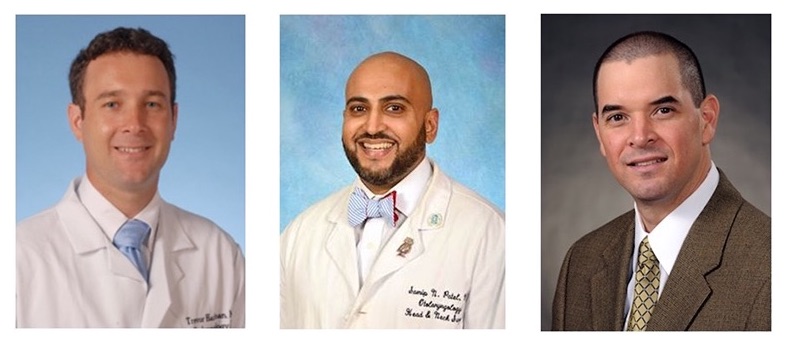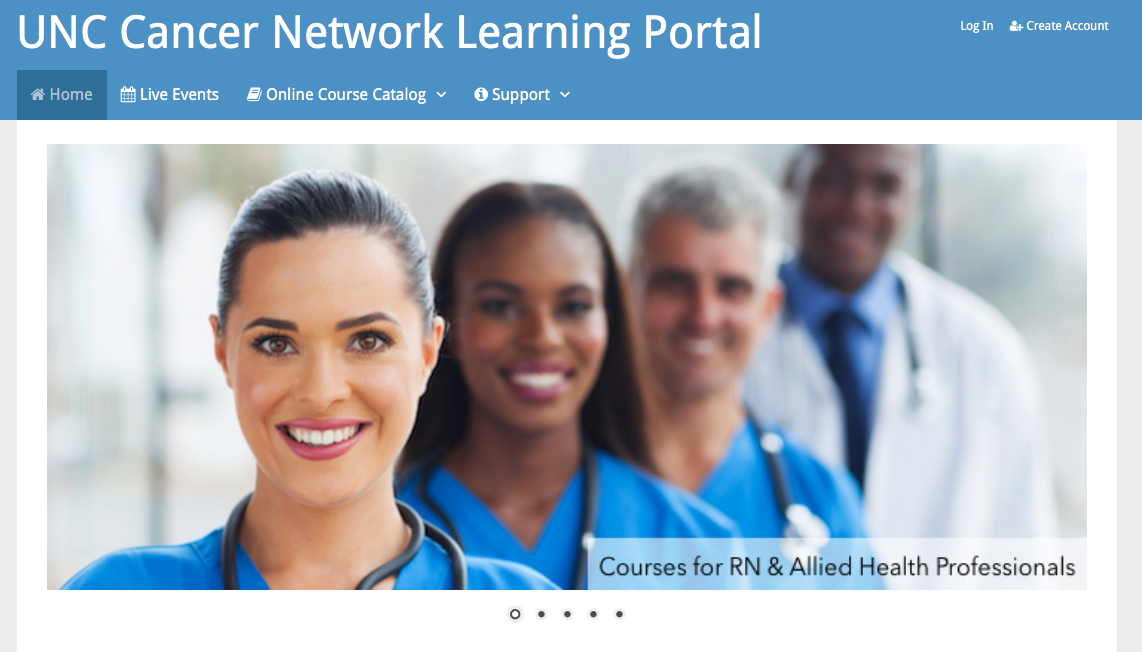Behind the Scenes — November 2017


From the Director of Telehealth
by Tim Poe
Though it seemed like it would never happen, fall colors are finally appearing, and leaves are really starting to come down. With autumn in full motion, there is plenty of excitement here at the UNC Cancer Network. I hope that you find this information informative, and we always appreciate your feedback and questions.
Many of you have expressed concern in the past that our lecture times were not convenient for your schedules. We now have a way to address these concerns, and much more! Please be sure to read Alan’s announcement regarding our new learning portal. This is the culmination of several months of hard work to bring our continuing education audience the ability to view and receive credit for specified lectures up to a year after they have been presented. We have received very positive feedback during the days leading up to the release, and I feel certain that you will be impressed.
For those who need video collaboration tools to use in association with the work they do at the UCN Lineberger Comprehensive Cancer Center, we are very pleased to announce that we now have Zoom Video Communications. This is replacing WebEx, which we have made available for the past several years. We think that those who depend on collaborative tools will be impressed with what Zoom has to offer. Please see www.uncc.org/zoom for details, and don’t hesitate to contact us with any questions that you may have.
We are very excited to be hosting a special lecture titled Oral Cancer: A Comprehensive Overview. This program will offer CNE, ASRT, CME and ADA continuing education credit (upon approval) for eligible participants. Please visit https://unclineberger.org/unclcn/events/conferences/dental-head-neck for details and registration.
Though it may seem like the year is winding down, we still have seven lectures left in 2017. Please be sure to visit https://unclineberger.org/unclcn/events for a full listing of upcoming lectures.
As always, our team strives to provide the citizens of North Carolina with the very best in oncology education and professional collaboration. We are extremely thankful to all speakers, lecture attendees, clinicians, and collaborators who make this possible.
All the best,
Tim
![]()

Spotlight on FDA-Approved Optune Device to Treat Glioblastoma
by Mary E. King
The Optune device is a portable FDA-Approved device designated to treat glioblastoma (GBM). GBM is an aggressive tumor that forms in the tissue of the brain and spinal cord, according to the American Brain Tumor Association. Today, GBM is increasingly common. With Senator John McCain recently being diagnosis with having glioblastoma, this disease has been the topic of discussion, more now than ever. Dr. Simon Khagi is the director of the UNC Brain Tumor Program and is using the Optune device to treat his patients. According to Dr. Khagi, the state of North Carolina has 500 GBM cases per year. I was recently granted a brief opportunity to talk with Dr. Khagi and ask a few questions about the device and how it is being used to help his patients at UNC (Click on the title of the article to read the interview and learn more).
Q. Why did you decide to use the Optune device?
A. Glioblastoma (GBM) is a notoriously difficult to treat brain cancer that impacts thousands of patients every year in the US. Standard treatment usually revolves around surgery, radiation and chemotherapy. However, after receiving the standard of care, median survival is still a little more than one year. Newer treatments are desperately needed.
In 2011, the FDA approved the use of Optune® for patients with recurrent GBM. This approval was based on a study which demonstrated survival that was no different when compared to various chemotherapies used in the setting of recurrent disease. This represented the first new treatment for GBM in over a decade.
Subsequently, in 2015, Optune® gained FDA approval for use in newly diagnosed GBM. This decision was based on the evidence that suggested Optune®, when combined with standard chemotherapy, improved median overall survival by 4 months when compared to chemotherapy alone. In a disease with a survival of about 15 months, an additional 4 months is a big step in the right direction.
Being a neuro-oncologist and knowing the devastating impact of this disease on my patients, I became intrigued and encouraged by a potentially promising new therapy. Prior to joining UNC, I gained exposure to Optune® during my training. However, much of the clinical trial data was not yet mature enough for wider adoption of this new technology until the latter years of my training.
Since joining UNC, I’ve adopted Optune® as a fourth modality of treatment of GBM. Given the promising data surrounding its use in newly diagnosed GBM, I recommend this device to most of my patients when considering maintenance chemotherapy.
Q. What is the scientific rationale?
A. The technical term for Optune® is alternating electrical tumor treating fields (TTF). These TTFs are applied to a shaved scalp via “palm-sized” arrays, and positioned in such a way as to deliver an effective dose to an area of disease. Preclinical studies demonstrated that when an alternating electrical field (not a current) is applied to a biological system (i.e. cancer cells in a dish), there is evidence of marked cell death. Particularly, cancer cells were unable to line up their chromosomes (i.e. their DNA) and divide, a process known as mitosis. It was determined that 200 kHz was the ideal field frequency that should be used in the setting of GBM. Subsequent animal studies also demonstrated benefit with this technique.
Q. How does it help your patients?
A. The addition of Optune® to maintenance chemotherapy has been shown to be beneficial. However, it is a BIG commitment and one that patients should clearly understand. As I mentioned earlier, the addition of Optune® to maintenance chemotherapy increased survival by 4 months. These results are not insignificant, but come with the stipulation that the device must be worn at least 18 hours per day (preferably longer) to potentially improve survival. Studies have shown that patients who wear the device more than 18 hours per day have a better survival compared to those that are unable to do so. Patients need to maintain a shaved scalp and periodically remove the device in order to clean their skin. The arrays are connected to a power source via wires. These wires are typically braided and tucked under a shirt or a blouse. The power source can be a battery pack that patients can take with them (typically concealed in a backpack or satchel) when they’re up and about. While at home, resting or sleeping, the patient can connect the device to an outlet.
Many patients have reservations about wearing the device as they feel that it would interfere with their quality of life and independence. When explaining the intricacies of the device, I mention that the study did not reveal any significant untoward effects on quality of life. However, I find that the best examples come from real-life examples. One of these examples comes from my travels through the airport and seeing a patient wearing this device. He appeared free to do what he wanted and was just disembarking from a flight to California. The device was so inconspicuously concealed that I wouldn’t have noticed if not for the fact that I have a lot of experience prescribing it.
Special thanks to Dr. Simon Khagi.
Device image used with permission of Novocore
![]()

Special Online Oral Cancer Lecture on December 8, 2017
by Mary E. King
The UNCCN Cancer Network is excited to announce that Dr. Trevor Hackman, Dr. Samip Patel, and Dr. Ricardo Padilla will be presenting a special online lecture on December 8, 2017, from 12 PM – 1 PM titled Oral Cancer: A Comprehensive Overview.
Pending approval, we will offer, ADA CERP, ANCC CNE, CME, and ASRT continuing education credit for this program. We are confident that this lecture will be very enlightening, and hope you will be able to join us. This event is free, but registration is required. Visit www.unccn.org/oralcancer for additional information and a link to register to attend. For questions, contact Alan Brown, Continuing Education Specialist at alan.brown@unc.edu or Mary King, Operations Coordinator at meking@email.unc.edu.
![]()

UNC Cancer Network Release New Learning Portal Website with Free CE Courses!
by Mary E. King
The UNC Cancer Network is excited to announce the release of a new website. The UNC Cancer Network Learning Portal (https://learn.unccn.org) is the new home to free and open-access online oncology education courses. (Click on the title to read entire article and learn more).
This site provides valuable, on-demand oncology educational resources regardless of your role as a healthcare professional, student, patient, caregiver, or interested member of the community.
All of the courses are based on our live telehealth, community, and community college lecture programs. RN and Allied Health courses offer ANCC CNE credit through the UNC School of Nursing, and Category A credit from the American Society of Radiologic Technology (ASRT). In addition to CNE and ASRT credit, the Medical and Surgical Oncology Courses offer AMA PRA Category 1 Credit™ thorough the UNC School of Medicine. In addition to certificates of credit, all courses also offer a general certificate of completion upon fulfillment of the course requirements.
The site and courses can be accessed from any device with an internet connection, including mobile phones and tablets. As we continue to produce live programs, the course offerings available on the site will continue to grow. Courses offering continuing education credit will be available for a period of one year after the date of their release.
Our hope is this new site will allow us to expand our reach in delivering oncology-related programs in education and research to healthcare practitioners, practitioners-in-training, and the public that will lead to reductions in morbidity and mortality from cancer and cancer-related illness in North Carolina and beyond.
View our Learner Quick Reference Document (https://learn.unccn.org/wp-content/uploads/2017/10/Learner-Quick-Reference.pdf) for any overview of the site and tips on getting started. Visit https://learn.unccn.org today to set up an account and begin to explore all this new site has to offer!
Special thanks to Alan S. Brown